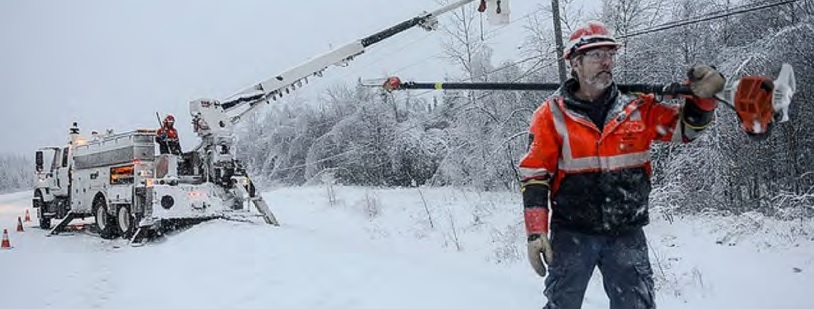NB Power’s debt is a problem for the province of New Brunswick and its taxpayers. As it stands, NB Power’s capital structure is over 90 percent funded by debt. This is a problem for the corporation’s ability to invest and adapt for the future. Unfortunately, it is...
Crown Corporations
Without Debt There Would Be Little Capital At All: A Valuation of NB Power
Nearly every province in Canada has its dubiously cherished government-owned power utility. Rarely in this country has there been one as hobbled by debt as NB Power, ‘NBP’. The fundamental business is relatively sound and appears to be resilient. However, its capital...
The Utility Company Pushing For Higher Costs For Its Customers: New Brunswick Power
NB Power is a Crown corporation wholly owned by the province of New Brunswick and is run by a board of directors. It was officially formed by the New Brunswick legislature in 1920, but it’s roots trace back as far as the 1880’s. Recently, the Energy and Utilities...
“Private” Liquor Stores Replacing SLGA Stores in Saskatchewan
Private liquor stores are popping up all over Saskatchewan. Almost all of Saskatchewan’s liquor stores have been converted to private liquor stores, except for a few remaining SLGA stores that will soon be turned private. However, these stores are still regulated by...
Featured News
Merry Christmas and Happy New Year!
Merry Christmas and Happy New Year from the Frontier Centre for Public Policy!
COVID-19 Emergency Powers Nearly Limitless
The war against the invisible enemy of COVID-19 has unfortunately made normal rights and freedoms invisible as well. Another example manifested on September 13 when Saskatchewan’s premier renewed emergency orders for his province. The list of powers he claimed were so...
Ferries to Relieve Traffic Congestion?
The new football stadium in the south end of Winnipeg has tremendous gridlock, requiring many fans to leave several hours early to arrive on time. Traffic in southern Ontario’s Golden Horseshoe is some of the worst in the world. In each case, ferries are being floated as a potential alternative to driving. It’s not clear how much they can practically do to relieve congestion, but it is certainly greater than zero. Given the cost of congestion mitigation, it may become economical in both instances.
What Lessons Will We Learn From the Lac Mégantic Tragedy?
The explosion, shocking loss of life and the incineration of idyllic downtown Lac Mégantic, Québec, is a catastrophe for the ages. The tragedy, however, allows us to learn new lessons. The Transportation Safety Board will investigate the causes of the accident, and wider policy questions are being asked about the security of towns built along rail lines and the safety of transporting oil by rail.
Nation-Wide Voters Shouldn’t (Unknowingly) Vote on Local Road Closures
Should the City of Winnipeg close Plessis Road during construction? If you’re not from Winnipeg, you likely don’t have an answer. It’s exceedingly unlikely that any more than 14 federal MPs have the slightest clue. Yet, the entire national electorate has essentially (and unknowingly) made this decision in the affirmative.
Britain’s Royal Mail To Be Privatized
Last week, the British government announced that the Royal Mail is to be privatized: The process of selling off the Royal Mail begins today with the promise of free shares for workers weighed against fears about layoffs and higher postage costs.... ...The Initial...
Taxis’ Fare Road to Profit: Restricted supply has inflated value of vancouver licence to $800,000
Gary Tarantino owns arguably the most valuable taxi in Vancouver, in an industry already known for its breathtakingly high licence values. Tarantino’s Licence 70384 could easily command more than $1 million in a business where the average Vancouver taxi costs $800,000. That’s because he is the last holdout of independent taxi owners in an industry where all of the other 687 licences are held by the city’s four taxi companies.
A Frontier Conversation with The Hon. Edward Schreyer, Premier of Manitoba, 1969-1977
A Conversation on the Frontier with a former Premier of Manitoba from June 25, 2013.
Economics Key to Crown Debate
There was a time in this province when one issue was guaranteed to provoke a debate as hot as the current weather: privatization of Saskatchewan’s Crown corporations.
Valuation Analysis Of SaskTel
In this policy study, Madsen examines a variety of indicators to ascertain the value of the Saskatchewan government owned SaskTel. Madsen follows well-established practices and methodologies that include two different approaches in order to gain an insight into the monetary worth of the Saskatchewan Crown Corporation. SaskTel is an historic Saskatchewan institution that has played a role in the development of the province. Established in 1908, communication in those days was not universal and did not always extend to every farm or hamlet. It could be very expensive and often impossible to get a telephone line, as well as quite expensive to keep one. The Internet, cellular telephony, cable television – even just television – had yet to be invented.
Media Release – How Much Value is Locked in SaskTel?
In this policy study, Madsen examines a variety of indicators to ascertain the value of the Saskatchewan government owned SaskTel. Madsen follows well-established practices and methodologies that include two different approaches in order to gain an insight into the monetary worth of the Saskatchewan Crown Corporation.



